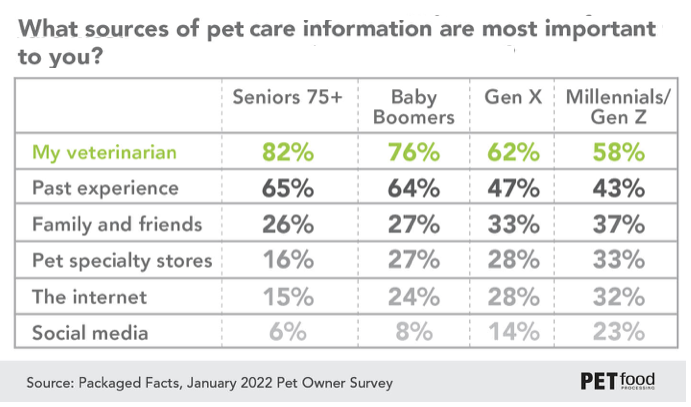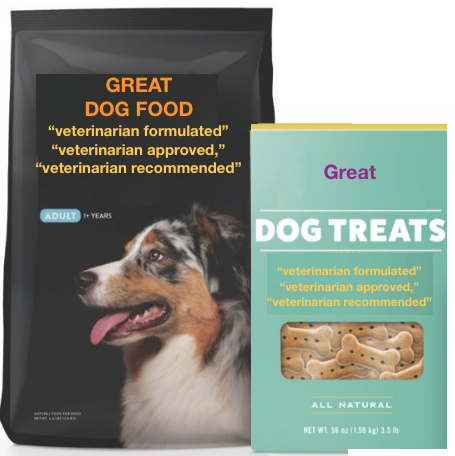Pet ownership has increased dramatically in the last 2 years. The pet food landscape has become a very cluttered and confusing category.
Understanding specific nutritional solutions catering to everyday health and wellness needs, disease prevention, age-related support or special requirements can be complex to both first-time and experienced dog owners.
Many pet parents, who are trying to determine what is the best food for their dog, may spend time doing their own research, having discussions with friends and family or even key influencers such as pet supply shop staff, veterinarians and clinic staff.
According to a pet owner survey conducted by market research firm Packaged Facts in January 2022, most pet owners — regardless of generation — claim their veterinarian as their most important source of pet care information. The internet and social media were ranked relatively low in importance but are becoming more common sources of pet care information at the expense of veterinary advice, the survey noted.
Today’s pet food shelves are ubiquitous and teeming with functional marketing claims to compel pet owner purchases. Many cite veterinarian endorsed claims such as:
- “veterinarian formulated”
- “veterinarian recommended”
- “veterinarian approved,”
What’s the difference? The seemingly subtle nuances between these claims are worth noting and generally unknown to consumers.
Veterinarian formulated
A “veterinarian formulated” claim is perhaps the most straightforward. It indicates that a veterinarian played a role in formulating the diet, “meaning they took into account the nutrients provided by each ingredient in their various amounts within the diet to ensure nutrient requirements and nutritional goals were met.
* It should be pointed out that it only takes one veterinarian to support the claim ‘veterinarian formulated’ or ‘veterinarian developed,’ assuming that fact can be sufficiently documented.*
Veterinarian recommended
Slightly less forthcoming, a “veterinarian recommended” claim means a significant number of veterinarians have recommended the product. This claim must be backed by a survey of veterinarians, guidelines for which have been stated by the Association of American Feed Control Officials (AAFCO).
- This claim can vary by state. In some states, claims around veterinarian-backed or veterinarian-recommended will require robust proof of the claim to support that it meets regulations. This can include what veterinarians are supporting this claim, whether or not it is a national distribution from the United States, whether a sufficient number of veterinarians were surveyed, and whether a certain percentage of those asked supported the claim.
- According to AAFCO, it is up to the brand to conduct a statistically sound survey of veterinarians to back up a veterinarian recommended claim. Surveying one or two veterinarians is not enough, the organization advised, and some companies have included up to 300 veterinary professionals in a survey to support this claim. State officials may ask for supporting data to substantiate this claim, so brands would be wise to do their research before taking it to market.
Veterinarian approved
According to the AAFCO, the claim “veterinarian approved” should not be used. Also in the grey area is the “veterinarian-reviewed” claim, which means that the formula was not developed by a veterinarian, but veterinary professionals reviewed the formulation and submitted recommendations to the brand.
This does not always mean the recommendations were followed, but it does mean they were given and that all of the AAFCO specific nutrient requirements have been met.
The claim “veterinarian approved” should not be used. It is deemed inappropriate by AAFCO. If certain criteria are met, brands may use “veterinarian recommended,” “veterinarian formulated” or “veterinarian developed,” but “veterinarian approved” is off the table — full stop.
Board-Certified Veterinary Nutritionists
Board-Certified Veterinary Nutritionists are in a unique position to add creditable value to a product’s efficacy.
It is important to distinguish between ‘veterinarian formulated’ and ‘formulated by a Board-Certified Veterinary Nutritionist.’
- Board-Certified Veterinary Nutritionists have extra training and research background, which enables them to formulate diets and to especially consider health concerns while doing it. Compared to a veterinarian, a vet nutritionist is required to take extra training in nutrition and complete a residency in nutrition. While all veterinarians receive training in nutrition, a vet nutritionist is a board-certified specialist that is uniquely trained in the nutritional management of both healthy animals and those with one or more diseases.
Other factors
While claims of veterinarian-formulated or veterinarian-backed pet food try to establish a superiority of nutrition and approval versus other diets, it is important to note that many other factors are more important to determine the quality of a brand of nutrition. Therefore, we should be encouraging pet parents to look deeper at a recipe to truly understand how well it will be supporting the health needs and the benefits they are seeking for their pet. In other words, a veterinarian-formulated or veterinarian-recommended claim may offer shelf appeal and help brands build trust with consumers, but it may not convey other key insights into the product’s formulation, proven benefits or compliance.
A better solution would be to help pet parents understand the details of pet food so that they can determine the health claims, ingredient declarations, guaranteed analysis and AAFCO statements on packaging. Aside from educating the consumer on key label information, vet-backed marketing claims work best when paired with other assurances, certifications or standards statements on the package.
It is important for the consumer to understand how the products were made. There are many very qualified (and sometimes more qualified) formulators who are not veterinary nutritionists or veterinarians. Unless the veterinarian is extensively trained in formulation (which can be indicated by their credentials as Board-Certified Veterinary Nutritionists), then it is best that food scientists and animal nutritionists work together with a veterinarian so that all the various aspects of creating a healthy pet food are taken into consideration.
Major Pet Food Manufacturers
The major pet food companies generally employ hundreds of veterinarians, food scientists, technicians, nutritionists, R&D specialists, and researchers. Some offer specialty foods sold only to veterinarians. However, as transparency, efficacy and functionality climb the ranks of importance in the pet food space, marketing claims such as veterinarian-formulated, veterinarian-recommended and veterinarian-reviewed should only be used as long as the claim reflects the efficacy of the product.
Perhaps it may be a good time to re-read the dog food labels. A visit to the manufacturer’s website may also provide additional information; not only to gather info that may be too much for the label to say, but also to gather more health, nutrition and safety information that may be written in straightforward non-marketing language.
[Link]
